
Crucial year for Chavez revolution
"The revolutionary offensive has begun," was how Venezuelan President
Hugo Chavez began his first TV show of 2008.
Dressed in a smart red shirt, the socialist leader seemed ready and
refreshed for a new phase in his political campaign as he introduced 13
new cabinet ministers following a major reshuffle.
"This is the start of a new public battle," he told viewers.
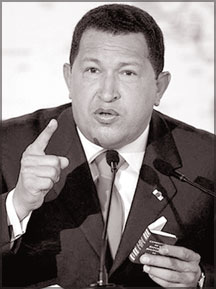
It was the first edition of his show "Alo Presidente" since an
election defeat that had knocked Mr Chavez for six and slowed his
socialist revolution.
Mr Chavez has had a month to reflect on what went wrong in December.
Venezuelans narrowly rejected wide-ranging reforms of the constitution
that were aimed at cementing socialism into Venezuelan law and that
would have given the president the chance to stand for re-election as
many times as he wished.
"I am responsible for that defeat," he told the nation. "We weren't
prepared and didn't have the level of organisation or consciousness for
such a big step in the revolution."
"I am forced to put the brakes on this march," he warned, telling his
ministers it was time to make some big changes.
"This will be the year of the three Rs: revision, rectification and
relaunching," he said, promising to thoroughly review all his policies
and ministries.
Mr Chavez has often been criticised for concentrating too much on
socialist ideology and affairs in other countries, rather than tackling
real problems at home.
Some Venezuelans questioned why he was spending so much time trying
to end neighbouring Colombia's conflict with the Farc rebels - although
the fruit of his labour appears to be the release of the two women
hostages, Clara Rojas and Consuelo Gonzalez, on Thursday.
Others question why he was investing so much in creating new
continent-wide political institutions.
Here, people are more interested in rising crime, food shortages,
rampant inflation and more mundane problems like the lack of rubbish
collections in many parts of the capital, Caracas.
Perhaps sensing he had taken his eye off these key issues, Mr Chavez
has this year begun to talk about them more.
"Insecurity and corruption are inherited evils that we must not allow
to continue expanding. If we don't stop them, they become the biggest
enemy of our revolution," he said. "And a revolutionary government
cannot ignore piles of rubbish."
Mr Chavez has also offered pardons to a number of people involved in
a coup against his government five years ago and he has talked about
reaching out to the middle classes, a part of society he usually has
little time for.
All this seems to indicate a toning down of his left-wing rhetoric
and confrontational politics.
But this is a clear contrast from a few weeks ago, when he used swear
words to describe the opposition's victory and pledged his reforms had
been halted only "for now".
Giant billboards and banners around Venezuela proclaiming this
message ensure no one forgets that his political aims are still firmly
in place.
So what is going on? Has Mr Chavez's much loved and much loathed
style altered? "Yes he looks like he's moderating," said Daniel Varnagy,
a professor in politics at Caracas's Simon Bolivar University.
"But his ideals haven't changed. He's not going to suddenly get less
lefty. "Maybe he's realised that an aggressive approach isn't the best
way to accomplish his goals. But he won't have lost track of his main
focus. And he'll be focused on concentrating power this year."
Both Mr Chavez and his political opponents now have their sights set
on October's regional elections for governors, mayors and local
councils.
"The opposition will concentrate all their force and imperialist
money to get me out of power," the president said on his show. "We can't
afford to lose a day or even a minute in our campaign."
Opposition aims
While those behind what is known here as "Chavismo" have been
analysing why they lost last year's key referendum, political opponents
have been trying to capitalise on their rare victory. They believe now
is the time to attack.
"Just 12 months ago, Hugo Chavez strode Venezuela's political scene
like a colossus and the opposition was worn thin, worn down and worn
out," wrote the authors of opposition blog site Caracas Chronicles.
"Now, it's Chavismo that's looking dazed and confused."
As the opposition parties begin to choose their candidates, they will
place more emphasis on showing they can be a united force.
"Our responsibility is to continue this atmosphere of unity so
democracy can progress," the executive president of the New Era Party,
Omar Barboza, said after a recent meeting of allies.
They will be trying to win over some of the three million voters who
in the past had voted for Mr Chavez but who abstained in December's
referendum.
Mr Chavez is hoping his new political party will also create some
unity within his ranks. More than five million people have registered as
members of the United Socialist Party of Venezuela (PSUV), with the most
active of these formed into thousands of battalions.
This is meant to be grass roots politics offering the party bases
more say in what goes on at the top.
But it is not without problems. Infighting and disagreements have
plagued it from the start with some striking schisms within Chavismo
unearthed.
With the PSUV's first national congress this weekend, all those
involved know that 2008 will be a crucial year for their revolution.
BBC
'Diana asked butler to check if she could marry surgeon'
Diana, Princess of Wales, secretly wanted to marry a Muslim heart
surgeon and asked her butler to consult a Roman Catholic priest to find
out how it could be done, Paul Burrell claimed.
The Princess's former aide told her inquest that she was condemned in
harsh terms by her mother, who was upset that she was having a
relationship with Hasnat Khan.
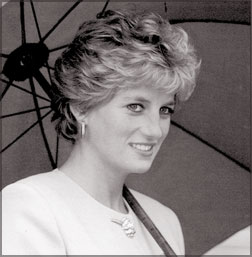
But after the Princess reluctantly split up with the Pakistani
consultant - her "soulmate" - she used the publicity from her holiday
romance with Dodi Fayed to make Mr Khan jealous, Mr Burrell claimed.
On the first day of his evidence at the High Court, Mr Burrell, 49,
boasted of being at the "hub" of Diana's social circle and claimed to be
a confidant to her innermost thoughts.
He did not believe that Diana planned to marry Mr Fayed, the son of
Mohamed Al Fayed, the Harrods store owner, but was "overwhelmed" by his
generosity, charm, attention and good looks.
She continued, he said, to be "burning a candle" for Mr Khan after
they split up following an emotional meeting late at night in Battersea
Park in July 1997. He said the couple had reached a "stalemate" because
she could not persuade the intensely private man to embrace public life
with her.
"The Princess said this was her soul- mate, the man she loved more
than any other," her former butler said. "It was a very deep and
spiritual relationship. I witnessed it at first hand and they were very
much in love."
|
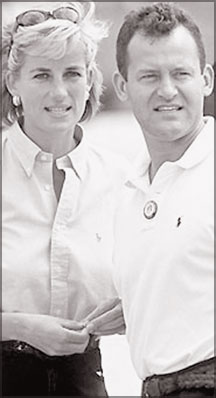
Princess Diana with Paul Burrell |
He claimed that she knew her trip to the Mediterranean with Mr Fayed
so soon after splitting up with Mr Khan would make the consultant
jealous. "It was conducted on a world stage," Mr Burrell said. "She knew
exactly what she was doing. She knew that the photographs taken in
public would be transmitted around the world. She knew full well that Dr
Khan would start the day at his local shop to pick up the papers.
"It was a message, I believe, to say, 'Look at me now, look where I
am'. I knew her inside out."
The "upper levels" of the Royal Family, including her sons, had known
of the Princess's affection for Mr Khan, and her neighbour, Princess
Margaret, was aware of the doctor's "clandestine comings and goings" at
Kensington Palace, where there were plans for him to have his own
quarters, Mr Burrell said. However, Diana's mother, Frances Shand Kydd,
was enraged by their relationship.
Under cross-examination by Michael Mansfield, QC, counsel for Mr Al
Fayed, Mr Burrell admitted that the Princess allowed him to listen in to
a telephone conversation in which Mrs Shand Kydd rounded on her daughter
as a "whore" for "messing around with effing Muslim men".
It was that telephone call that prompted Diana to sever links with
her mother, who died in 2004. Asked by Ian Burnett, QC, counsel for the
coroner, whether the Princess had contemplated marrying Mr Khan, Mr
Burrell said: "She did ask me if I would be prepared to arrange a
private marriage between her and Mr Khan. So I thought the best person
to speak to was my parish priest, Father Anthony Parsons." Mr Burrell is
not Catholic, but his wife and two children are.
Diana, 36, Mr Fayed, 42, and their driver, Henri Paul, died in Paris
in a car crash in August 1997.
|
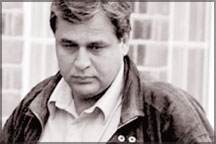
Hasnat Khan |
Mr Burrell said it was "impossible" that the Duke of Edinburgh would
have ordered the murder of the mother of princes William and Harry, as
Mr Fayed's father believes.
Mr Burrell also rejected Mr Al Fayed's claim that the Princess and
Dodi were about to become engaged, adding that he did not think the
Egyptian was "the one" for her. The former footman, who has written two
books about his time working for the Princess and who flew from his home
in Florida for the hearing, was asked about a note she wrote to him in
which she said the Prince of Wales was "planning an accident in my car".
He said he knew of nothing to support the idea that the Princess or
Mr Fayed were victims of a murder plot. Referring to letters he had seen
from the Duke of Edinburgh to the Princess, he admitted that they were
"sharp" but said that they were not nasty and, instead, reflected the
"healthy banter" the pair engaged in.
The inquests continue.
Timesonline, UK
Bush praises Iraqi Baathist law
US President George W Bush has praised a new law in Iraq that will
allow former members of Saddam Hussein's Baath party to return to public
life.
Mr Bush called it an important step towards national reconciliation.
The Baath party, formed mainly from Iraq's Sunni minority, was
declared illegal after the US-led invasion of the country in 2003.
The US had been urging Iraq's Shia-led government to approve the move
in a bid to reach out to minority Sunni Arabs.
The new law will allow thousands of former party members to apply for
reinstatement in the civil service and military.
"It's an important step toward reconciliation, it's an important sign
that the leaders of that country understand that they must work together
to meet the aspirations of the Iraqi people," said Mr Bush.
The president was speaking in Bahrain, the latest stage in a tour of
the Middle East. Earlier, in Kuwait, he said hope was returning to Iraq.
BBC
India, China to cooperate in civil nuclear energy
Bilateral cooperation in civil nuclear energy, Chinese support for
India's desire to play a greater role in the United Nations Security
Council, and the possibility of commencing discussions on a Regional
Trade Agreement, all found place in a joint document signed by Prime
Ministers Manmohan Singh and Wen Jiabao on Monday evening.
The document, titled "A Shared Vision for the 21st Century" did not,
however, indicate any breakthrough on the boundary dispute. There was
instead a reiteration of the official position of both sides to seek a
"fair, reasonable and mutually acceptable solution," on the basis of the
political parameters and guiding principles announced in 2005.
|
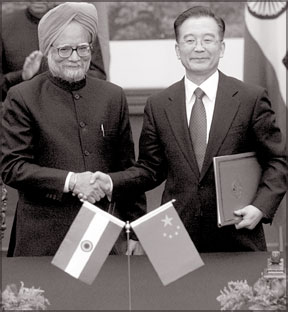
Chinese Prime Minister Wen Jiabao and Indian Prime Minister
Dr. Manmohan Singh greeting each other after signing the
landmark document “ A Shared Vision for the 21st Century” -AFP
|
Moving beyond the statement on nuclear cooperation made in the joint
declaration issued during Chinese President Hu Jintao's visit to New
Delhi in November 2006, the "Shared Vision" states that "the two sides
pledge to promote bilateral cooperation in civil nuclear energy,
consistent with their respective international commitments, which will
contribute to energy security and to dealing with risks associated with
climate change."
Briefing reporters on the statement, Foreign Secretary Shiv Shankar
Menon said that it showed the "clear expression of the will to cooperate
in this [civilian nuclear energy] area."
Responding to a question whether or not China had indicated its
willingness to support India on the nuclear issue at the Nuclear
Suppliers Group (NSG), Mr. Menon replied, "If NSG members are ready to
cooperate with us for nuclear energy, it will have certain implications
for their response to the nuclear issue at the NSG."
The joint statement also mentioned for the first time that "The
Chinese side understands and supports India's aspirations to play a
greater role in the United Nations, including the Security Council." Mr.
Menon called the inclusion of the phrase "including the Security
Council" an "incremental" but important development.
The interaction between Dr. Singh and Mr. Wen took place over a
four-hour period, including talks, a signing ceremony and a banquet
hosted by the Chinese Premier. Dr. Singh described his talks with Mr.
Wen as "constructive and forward looking."
The positive chemistry between the two leaders was evident during the
welcome ceremony at the Great Hall of the People when on occasion Mr.
Wen placed a light hand on Dr. Singh's back to guide him through the
guard of honour given to the leaders by the People's Liberation Army.
Mr. Menon also stressed the element of personal warmth in the
relations between the two leaders, highlighting the fact that the
Premier had given Dr. Singh a private dinner on Sunday night, a gesture
that was not the norm on these occasions.
A major focus of both the joint statement and the talks themselves
was on the global and regional dimensions of bilateral ties. The "Shared
Vision" document thus includes common positions that the two countries
share on a range of issues including the WTO and climate change. It also
stressed that "India-China relations are not targeted at any country,"
nor will the relations affect their friendship with other countries.
On trade, the two sides announced a new bilateral target of $60
billion by 2010, given that the earlier target of $40 billion was almost
met in 2007 itself.
The joint document also revealed that the report of the Joint
Feasibility Study on a potential Regional Trade Agreement had concluded
that an India-China RTA would be "mutually advantageous."
Despite strong opposition from Indian industry, an agreement to
"explore the possibility of commencing discussions" on the RTA through
the mechanism of the Joint Economic Group was thus announced. It was
also decided to establish a business leader's forum to give feedback to
the government on ways of strengthening the economic engagement.
In addition to the Shared Vision document, 10 bilateral documents
were signed, including memoranda of understanding in a diverse range of
sectors from railways, housing, land resources, cultural exchanges,
geo-sciences, traditional medicine, agriculture and exports of Indian
tobacco to China. The determination to intensify high-level exchanges
was also expressed.
Mr. Wen invited President Pratibha Patil to visit China in 2009,
while Dr. Singh extended an invitation to the Chairman of China's
National People's Congress, Wu Bangguo, to visit India this year itself.
The Foreign Ministers will make exchange visits this year as well.
The Hindu, India
Benazir's heir and the future of Pakistan
Bilawal Bhutto Zardari's first international outing last week as the
head of the Pakistan People's Party nearly descended into a shambles,
thanks to the ill-advised choice of the venue - the basement of a small
London hotel that was apparently his mum's favourite haunt.
Such a setting might have done for a 19-year-old Oxford undergraduate
with a less famous name and dynastic ambitions, but - as The Times noted
- it proved clearly "unfit for the purpose" at hand, which was to
present "Pakistan's young pretender" to the world press.
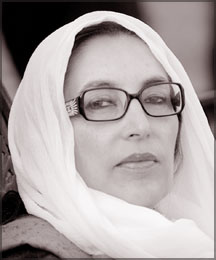
Clearly, Mr. Bhutto's advisers underestimated the media interest in
their young leader, resulting in chaotic scenes with scores of
journalists crammed into a tiny room jostling for space and yelling for
attention.
Except for a few sharp questions about his dynastic succession, Mr.
Bhutto was given an easy ride by reporters, some of whom had known his
mother. But it was a one-off. Soon, the sympathy factor will vanish,
exposing him to closer scrutiny; and with the kid-gloves gone, he will
not be allowed to get away with the sort of stuff he peddled that
morning.
Yet, for his age and, given the circumstances, he handled it well,
appearing to bristle only once when the BBC's Jeremy Paxman, notorious
for his robust interrogation technique, wanted to know if his coronation
wasn't a bit like treating the party as a "piece of family furniture."
"I did what I had to do"
"No, it [the leadership] was not handed down as family furniture. In
a moment of crisis, I was called and I stepped up and I did what I had
to do," Mr. Bhutto said, though admitting under pressure that continuing
the Bhutto "bloodline" was important for the unity of the party.
For the most part, it was a confident and self-assured performance,
and if the idea was to unveil the new PPP boss to the world before he
lost his innocence, it worked.
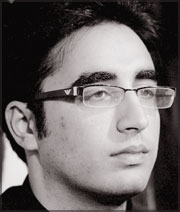
Particularly, it was his prognosis of Pakistan at this critical
juncture that resonated with his mostly Western audience. He told them
what they wanted to hear - namely that Pakistan was teetering on the
brink, thus confirming the conventional wisdom among British political
pundits.
"I fear for my country, I fear that if free and fair elections are
not held it may disintegrate," he said.
"Disintegration" has been a central theme of the debate on Pakistan's
future in the wake of Benazir Bhutto's assassination. Benazir is seen to
have been Pakistan's "last hope" and with her murder - the argument goes
- it is, effectively, all over for that blighted country.
Seldom have terms such as "disintegration" and "on the brink of
collapse" been used so widely and with such certitude as in relation to
Pakistan in recent days. The post-Benazir turmoil has been portrayed as
Pakistan's worst crisis in its 60-year-old tempestuous history - a blow
from which, it is argued, it can recover only if President Pervez
Musharraf is sent packing, paving the way for full-blooded Western-style
democracy.
The venerable Economist declared General (retd.) Musharraf's Pakistan
the "world's most dangerous place," and warned that it is in Pakistan
that the "war" against Islamist extremism would be "won or lost." In a
chilling depiction of the current state of Pakistan, it had a cover
dominated by a hand-grenade painted in the colour of Pakistan's national
flag, and ready to go off.
The visual was matched by a relentlessly gloomy analysis arguing that
Benazir's murder had made Pakistan more vulnerable to being overrun by
the Taliban brand of Islamic fundamentalism, which could turn it into a
version of what Afghanistan was when the Taliban ruled that country.
On President Musharraf and his American patrons, its verdict was that
for too long he had been allowed to pay "lip-service to democratic
forms" while Washington looked the other way. "It is time to impress
upon him and the Generals still propping him up that democracy ... is
Pakistan's only hope," it said.
It is striking how a man who, recently, was regarded as the best bet
for Pakistan is now being portrayed as its biggest liability. And, in
death, Benazir has become the saviour-who-was-not-to-be.
Some of the very same arguments that were once used to justify
Western backing for President Musharraf (in a land of "mullahs," he was
hailed as a beacon of secular and liberal values) are now being advanced
to glorify Benazir, her added USP being that she was also a "democrat"
and, with her Harvard and Oxford background, "one of us."
It is acknowledged that Benazir's two terms in office were a disaster
- a record of incompetence and broken promises, compounded by
allegations of corruption and cronyism.
Her role in encouraging the sort of extremists who killed her is also
widely recognised, as is the opportunistic nature of her deal with
President Musharraf. But, for all that - it is argued - she was the only
national leader. And, crucially, she was not General Musharraf -
supposedly the most hated figure in Pakistan since his disastrous
experiment with Emergency.
There is almost a touching romanticism in the way visions of a
Benazir-led Pakistan are being invoked. To quote the Economist again:
"Pakistan may not have realised how much it would miss her, until now
she is gone. "Expatriate observers, with a better understanding of the
dynamics of their country's politics than instant Pakistan "experts" in
the British commentariat, have fewer illusions.
The Hindu
Japan plans Tokyo missile shield
Japanese officials have carried out exercises to see whether a
missile defence shield could be deployed in the capital, Tokyo.
Teams set up radio masts and tested communications at two separate
locations in the city. The military was assessing whether Patriot
Advanced Capability 3 (PAC-3) surface-to-air interceptor missiles could
be deployed at such sites. Concern over North Korea has prompted Japan
to up its missile defence.
In 1998 Pyongyang test-fired a long-range Taepodong-1 missile over
northern Japan. In 2006 the communist state also tested a longer-range
missile, as well as carrying out a nuclear test. The Japanese military
carried out their assessment in the capital overnight.
According to a military spokesman, the two sites surveyed were
Shinjuku Park, a business hub in central Tokyo, and a site in Ichigaya,
not far from the Imperial Palace and key government offices.
BBC |
